-
Your 4-Year-Old’s Cognitive Milestones
Developmental milestones refer to different things that children can typically do by a specific age. If your child is entering pre-kindergarten in Pembroke Pines this year, then you can monitor his problem-solving, thinking, and learning development by understanding and watching for the cognitive milestones for 4-year-olds.
By the time they enter pre-k or reach age 4, most children grasp the concept of counting, have some understanding of time, and can recognize when things are different or alike. Also, pre-kindergarten students are often able to play card or board games, remember aspects of a book, and guess what may happen next in a story. By age 4, many children also start to use scissors, draw figures with 2 to 4 body parts, and copy capital letters.
Monitoring how your pre-k student moves, learns, speaks, plays, and behaves can help you check off these cognitive milestones and keep his doctor updated about his level of development.
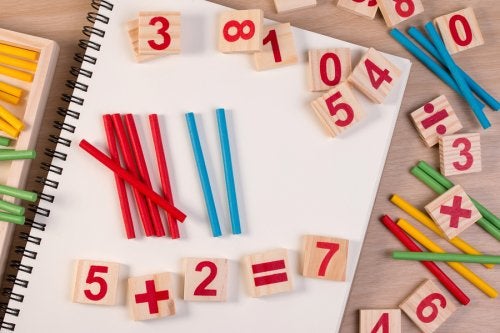
-
Top Tips for Transitioning from Summer Camp to School
The days are getting shorter, and the temperatures are dropping. For parents and students, these changes mean the end of summer break and the beginning of a new school year. If your child is enrolled in summer camp in Pembroke Pines , then continue reading for tips on helping her with the transition to school this fall.
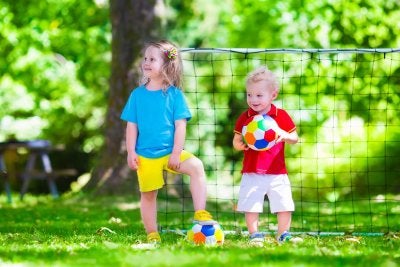
Get Back on Schedule
Even though your child is keeping busy at summer day camp and benefiting from regular mental stimulation, there is a good chance that she, like many other students, is in a summertime mindset that may make it difficult for her to get back into learning mode. One way to help prepare your child for the transition from camp to school is to make a gradual return to a normal schedule. For example, you might get her back on a good bedtime schedule or set aside time for learning that will be replaced with homework once the semester begins.
Spend Time in Nature
For kids in summer camp, their break from school means lots of time spent outdoors surrounded by and experiencing nature. To make the transition back to a classroom setting an easier one for your child, think about how you can incorporate outdoor activities into your normal routine. To do this, you could start taking daily walks to the park, arranging weekend day trips to the forest, or helping your child start her own backyard garden.
Talk About Any Fears
Some kids are always excited about going back to school. Others, however, face anxiety about entering a new classroom setting. If your child experiences fear about leaving summer camp and beginning a fresh school year, then set aside time to address her worries, and speak with her about the fun experiences she should look forward to and all the friends she can make. Finally, you can even approach this with a role play technique by setting up a classroom at home and arranging learning activities for you and your child to complete together.
-
What Are Some Key Developmental Areas of Toddlers?
Kids change rapidly during their toddler years. As parents, you’ll see your child hitting developmental milestones almost constantly, which is why having an early learning center in Pembroke Pines you can count on is so important. With an early learning center, your toddler will not only hit developmental milestones but also get to practice them on a regular basis, so that they can keep advancing.
At the start of their toddler years, most children can use stationary objects to pull themselves up, use simple explanations, eat with their fingers, and display emotional attachment. By the time toddlers are around the age of three and ready for preschool, they may be able to take turns when playing games, follow multistep instructions, name colors, and grasp pencils and crayons. They can also retell stories, turn book pages, and name common objects. Through an early childhood education program, your toddler will be able to foster these skills and use them naturally in the classroom and at home.
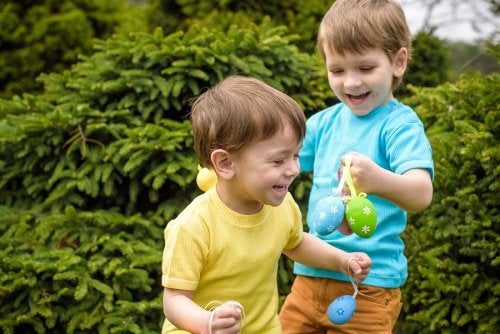
-
Teaching Social Awareness and Acceptance in First Grade
Will your child be starting first grade in Pembroke Pines ? If so, then both of you are probably excited about this next step, and you may realize that now is a time of rapid development for your student. Read on to learn how your child can benefit from being introduced to social awareness and acceptance while he is in first grade.
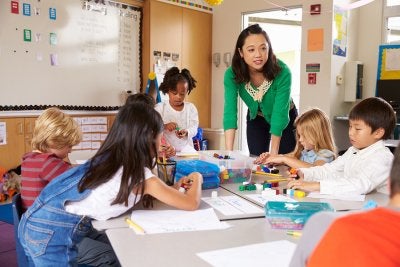
Noticing Differences
Children become aware of differences between themselves and others around age 2 or 3. At these ages, they begin to differentiate between boys and girls, show curiosity in differences in hair and skin color, and become aware of obvious disabilities. Additionally, children start to develop racial identities and attitudes at a young age, and research suggests that kids as young as 3 who are exposed to racism and prejudice may embrace and accept these views, even if they don’t understand the feelings behind them. For these reasons, it can be beneficial to introduce first graders to the concepts of social acceptance and awareness at this stage in their development.
Reversing Biases
The bright side for any concerned parent is that biases which children pick up can be reversed and unlearned through positive exposure to diversity. Children have an inherent affinity for fairness, and harnessing this desire and using it as a springboard for conversations about bias and discrimination can help build social awareness and acceptance in children. On the other hand, research has shown that when not addressed, children will notice differences and may develop prejudices, even if they are not discussed by parents. Because of this, not talking to and teaching first graders about bias can allow discriminatory notions to become entrenched in their developing minds.
Learning Elementary Strategies
First grade is an ideal time to teach understanding, awareness, and social acceptance to children. For this purpose, experts recommend 5 strategies that can be beneficial to elementary school-aged children. Using children’s literature, teaching anti-bias lessons, exploring solutions, incorporating the news and media, and giving examples that they can recognize and understand are all ways in which first graders can be introduced to and taught social awareness and acceptance.
-
The Importance of Hands-On Puzzles for Your Child’s Development
Few things are as important in early education and child development as hands-on activities. Puzzles are often used in early education classrooms as a tool to help children learn. You can bolster your child’s success in early education in Pembroke Pines by keeping hands-on puzzles available at home as well.
Hands-on puzzles provide three learning experiences for early education students. First, they get the opportunity to work on fine motor physical skills by holding the pieces and working them into different positions until they fit. Students get to practice cognitive skills as they attempt to solve the problem presented by the puzzle. Young learners also build emotional skills by working on puzzles, as they must practice patience and perseverance as they work to solve the puzzle and then are rewarded with the satisfaction of finishing the puzzle. When children solve puzzles together, they also get to practice social skills and learn to compromise and work collaboratively. Provide a variety of different puzzle types to boost your child’s learning experience.
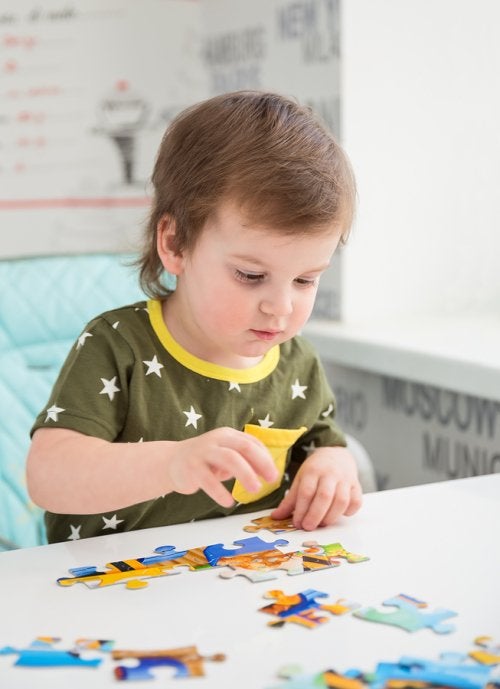
-
Kids and Reading for Pleasure
As your child reaches first grade , he or she will gradually read with greater fluency. During this sensitive age, it’s important that first graders in Pembroke Pines be encouraged to choose their own reading materials outside of class. Take your first grader to the library on a routine basis and let him or her choose books that appeal to him or her. The freedom of choice enables your child to develop a love of reading and it allows you to get to know your child’s interests better.
Watch this video to hear a child development expert discuss literacy in the early years. He explains that first graders are more likely to be receptive to their parents’ recommendations for first grade reading materials when the parents respect the children’s primary reading choices.
-
Understanding Early Childhood Development
When your child attends an early childhood learning center near Pembroke Pines for preschool, kindergarten, or first grade, he will develop valuable life skills and reach key child development milestones faster. Early childhood development encompasses the emotional, social, and physical development of children between the ages of 2 and 8 years old.
Watch this video to learn more about the stages and importance of early child development skills. Jack P. Shonkoff, M.D., a Harvard professor, discusses the basic concepts of early child development, and the science behind it. Early childhood learning centers focus on fostering and encouraging the growth of early child development skills through the use of a comprehensive, well-rounded early childhood curriculum taught by professionals who have been trained and educated in encouraging independence, creativity, and healthy expression in children.
-
Knowing the Signs of a Great Preschool
Picking out the right preschool near Pembroke Pines shouldn’t be stressful. There are a few ways to pick the best preschool for your child. In the end, though, if you and your child feel it is the school for your family, you’ve probably picked the right one.
Fun Structure
 When you walk into a preschool classroom and see children having fun and learning at the same time, you’ve found a great school. Young children shouldn’t be wandering around aimlessly or running amuck; they also shouldn’t be glued to a chair, bored out of their minds. Teachers should be focused on fun learning activities, crafts, and educational games to keep children’s minds engaged.
When you walk into a preschool classroom and see children having fun and learning at the same time, you’ve found a great school. Young children shouldn’t be wandering around aimlessly or running amuck; they also shouldn’t be glued to a chair, bored out of their minds. Teachers should be focused on fun learning activities, crafts, and educational games to keep children’s minds engaged.Practical Learning
At such a young age, children don’t need to learn the intricacies of calculus and physics, but they can learn basic math and science as it applies to the world around them. Their teachers can show them how to add ingredients to a recipe; how flowers grow; or the ways the alphabet make up their classmates’ names. There are a variety of tactics teachers and parents can employ to teach children the fundamentals of academics and practical life
Adaptable Education
No one learns at the same pace, and learning centers should recognize that. The curriculum should be adaptable to each child or group of children, whether they are progressing above or behind the rest of the class. A good teacher will have the resources necessary to help each child progress at their own pace.
Individualized Attention
Many classrooms have become overcrowded, and that is not what you want to see in your preschool. There should be enough teachers and aides to give each child, or a small group of children, dedicated attention. This may in the form of reading a book or individual tutoring as children need it. The class should still come together as a whole to learn new concepts and rules, but there should be adults available for every child to receive extra attention.
-
Choosing the Right Preschool Programs
Before your child begins kindergarten near Pembroke Pines, he should attend preschool at an early childhood education center near you . The majority of early childhood development occurs before the age of five, and a preschool program can encourage and facilitate your child’s cognitive, academic, social, and emotional development. Your child will be better prepared for kindergarten and his future academic career if he attends a preschool program at an early childhood development center.
Watch this video for some great tips on choosing the right preschool program for your child. Jennifer Kaywork, Ed.D., the professor of teacher education at Dominican College, discusses the importance of an early childhood education.
-
Talking to Your Toddler About Going to Child Care
When it’s time for your toddler to go to child care near Pembroke Pines, he or she will look to you to determine how to react. If your child senses that you’re nervous about leaving him or her at the day care center , then he or she is likely to be anxious about it, too. Help your child adjust to the change by talking about child care in a positive manner. Discuss how exciting it’s going to be for your child; he or she can make new friends, play with new toys, have snack time, and have story time. You could also read picture books together about children who have fun at child care centers.
Once you’ve introduced the idea of child care to your toddler, it’s time to schedule a visit to the early childhood education center. Walk around the classroom with your toddler, meet the caregivers, and if possible, meet other children and parents. When child care is no longer an unknown factor for your child, he or she will feel much more comfortable about going there.

RECENT POSTS
categories
- Uncategorized
- Early Learning Center
- Pre-K
- Children
- Child Care Center
- Preschooler
- Preschool Blog Category | Tanglewood Academy
- Preschool Lunch
- Tanglewood Academy
- After-School Program
- Toddler School
- Early Childhood Education
- preschool activities
- pre-kindergarten
- childhood education
- pre-kindergarten programs
- Children’s education
- enrichment opportunities
- Kindergarten
- Nurturing Education Environment
- Toddler Care
- Child Separation Anxiety
- Toddlers
- Summer camp
- summer activities
- VPK
- Voluntary Pre-K
- Outdoor Activities
- Smart Strategies
- Tie Shoes
- Snacks
- Physical Activities
- Education
- Enrichment Activities for Kids
- Early Education Activities
- Preschool Curriculum
- Classroom Learning
- APPLE accreditation
- Language Comprehension
